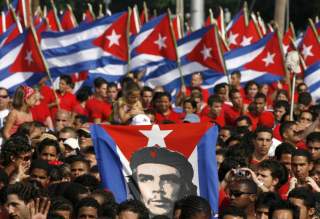Che, Stalin, Mussolini and the Thinkers Who Loved Them
Why are intellectuals and thinkers, who normally face persecution and risk under dictatorial regimes, nonetheless attracted to tyrants and would-be liberators?
“Today Rakosi speaks on the radio . . .
The wind subsides, and the heart of the country
is throbbing in the palm of his hand.”
Like Stalin, Hollander informs us, Rakosi “was credited with being omniscient, omnipresent, powerful, just, kind, and caring. He too got by with minimal sleep; stayed in his office from early morning until late night; managed to read several hundred pages a day, which included politics, history, science, and fiction.” I could go on, but I’m sure you’ve got the idea.
About Uncle Joe himself, Hollander draws an interesting distinction, emphasizing that the admiration of intellectuals for Stalin
“was not stimulated by his charisma, such as that possessed by Mussolini, Hitler, and Castro. Unlike them he rarely spoke to crowds, and when he did he was by no means an electrifying speaker. Nor did he project a heroic, dynamic demeanor. Charisma, as generally understood, played little if any part in his rise to power and worship. Rather, it was a deified image, part father figure, that was the source of his attraction.”
Aside from that, he was true to a vein of Russian tradition going all the way back to Ivan the Terrible—scaring the hell out of people. They knew he held the total power of life or death over them and never hesitated to use it.
Highly revealing, but not included in the book, is a rather amusing account of a nocturnal meeting between Stalin and the legendary Soviet film director Sergei Eisenstein on February 25, 1947, one hour before midnight. Stalin had loved part one of Eisenstein’s crowning masterpiece Ivan the Terrible, but was unhappy with the sequel which—quite truthfully—depicted Czar Ivan as an increasingly paranoid brute who shared many personality traits with a certain Georgian-born Soviet dictator. In particular, Eisenstein had depicted the oprichnina, a savage paramilitary force raised by Ivan to terrorize his subjects in the later years of his reign, in what Stalin considered an unkind light. Eisenstein later recalled the interview:
“Stalin: Have you studied history?
“Eisenstein: More or less.
“Stalin: More or less? I too have a little knowledge of history. Your portrayal of the oprichnina is wrong. The oprichnina was a royal army. As distinct from the feudal army, which could at any moment roll up its banners and leave the field, this was a standing army, a progressive army. You make the oprichnina look like the Ku-Klux-Klan.
“Eisenstein: They wear white headgear; ours wore black.
“Molotov (also present at the meeting): That does not constitute a difference in principle.
“Stalin: Your Tsar has turned out indecisive, like Hamlet. Everyone tells him what he ought to do, he does not take decisions himself. Tsar Ivan was a great and wise ruler . . . Ivan the Terrible’s wisdom lay in his national perspective and in his refusal to allow foreigners into his country, thus preserving the country from foreign influence. In showing Ivan the Terrible the way you did, aberrations and errors have crept in. Peter I was also a great ruler, but he was too liberal . . . Ivan the Terrible was very cruel. You can depict him as a cruel man, but you have to show why he had to be cruel. One of Ivan the Terrible’s mistakes was to stop short of cutting up [the modern term would be ‘liquidating’] the five key feudal clans. Had he destroyed these five clans, there would have been no Time of Troubles. And when Ivan the Terrible had someone executed, he would spend a long time in repentance and prayer. God was a hindrance to him in this respect. He should have been more decisive.”
Eisenstein’s career never really recovered from Stalin’s verdict that he had depicted Ivan the Terrible as too religious—and not terrible enough—in the second part of his magnum opus.
To paraphrase Erasmus by way of Cecil Rhodes: So much folly, so little time. Hollander is a superb cicerone to what amounts to an intellectual freak show, a gallery of great minds entranced by even greater villainy. He has produced a devastating catalogue of the delusional propensities that led so many modern intellectuals to embrace so many dictators of varying degrees of infamy. Perhaps the last word on the subject should go to another wise refugee from communist Hungary who, as the son of Stalinist apparatchiks, knew whereof he wrote—my old friend the late Tibor Szamuely, quoted by Hollander in his book:
“[A] striking—and paradoxical—aspect of ‘progressive’ intellectuals’ involvement in politics is the fundamentally non-intellectual nature of their commitment . . . it is almost invariably an emotional attitude, owing very little, if anything, to the process of reason and study that one usually associates with the word ‘intellectual.’”
Aram Bakshian Jr. served as an aide to Presidents Nixon, Ford and Reagan, and has written extensively on politics, history, gastronomy and the arts for American and overseas publications.
Image: Cubans march during the May Day parade on Revolution Square in Havana, May 1, 2007. Reuters/Claudia Daut

